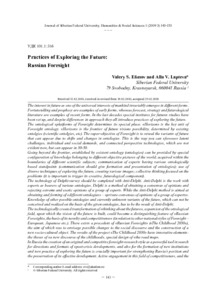Практики работы с будущим: Русский Форсайт
URI (для ссылок/цитирований):
https://elib.sfu-kras.ru/handle/2311/1539Автор:
Ефимов, В.С.
Efimov, Valery S.
Лаптева, А.В.
Lapteva, Alla V.
Дата:
2010-02Аннотация:
Показано, каким образом универсальный интерес человечества к будущему принимал
различные формы - «практики работы с будущим», с характерными для них содержаниями и
способами деятельности. Проанализированы следующие практики: Замысливание-Действие;
Проектирование; Исследование и Прогнозирование; Сценирование; Стратегическое
планирование и программирование; Форсайт. Для данных практик выделены их онтологические
основания; сопоставлены их организационно-деятельностные схемы и инструментарий.
Особое место Форсайта среди практик работы с будущим определяется его онтологической
«платформой». Ключевой единицей онтологии Форсайта является «горизонт» - граница
возможности видения будущего, определяемая наличными онтологиями (управленческими,
научными и др.). Сверхзадача Форсайта - выявить варианты будущего, определяемые
возможными трансформациями онтологий. Именно таким образом возможно «предвидеть»
не проявленные в настоящее время, но могущие возникнуть через 30-50 лет новые потребности
человека и общества, новые вызовы, а также связанные с ними перспективные технологии.
Выход за границу, определенную наличной онтологией, может быть технологически обеспечен
конфигурированием знания, принадлежащего различным предметным картинам мира;
коммуникацией экспертов, занимающих различные онтологически фундированные позиции;
применением разнородных методик, дающих различные картины будущего; организацией
сфокусированного на проблемах коллективного мышления.
В качестве перспективной обсуждается новая технология, нацеленная именно на фиксацию и
прорыв границы возможного видения - технология «Анти-Делфи». Она нацелена на выявление
и четкое оформление «онтологических развилок» (в отличие от формирования «экспертного
консенсуса» в рамках Делфи). Итогом Анти-Делфи должно стать знание об иных возможных
онтологиях и непредставимых в настоящее время вариантах будущего, которые могут быть
помыслены и реализованы на основе данных онтологий.
Технологически выстроенное преобразование «мышления про будущее», расширение
онтологического поля, на котором строится видение будущего, может стать отличительной
особенностью «Русского Форсайта», основой его новизны и конкурентоспособности (в
отношении к другим национальным стилям Форсайта - европейскому, японскому и др.).
Существует прецедент Форсайта в России («Детство 2030»), предметом видения в
котором были возможные изменения общественного дискурса и конструирование нового
социокультурного объекта. Результаты данного проекта содержат инновационные по своему
типу элементы: тезисы «нового дискурса детства» и особую по конструкции «дорожную
карту».
Период поиска направлений и форматов «посткризисного развития» создает условия - «окно
возможностей» - для формирования в России новых институтов и новой практики работы
с будущим, которая позволит существенно усилить позиции страны. Важным для России
является активное вхождение в поле конкуренции и партнерства в связи с «конструированием»
и «приватизацией» будущего, «захват» и удержание позиций в сфере стратегирования и
Форсайта. The interest in future as one of the universal interests of mankind invariably emerges in different forms.
Fortunetelling and prophesy are examples of early forms, whereas forecast, strategy and futurological
literature are examples of recent forms. In the last decades special institutes for futures studies have
been set up, and despite differences in approach they all introduce practices of exploring the future.
The ontological «platform» of Foresight determines its special place. «Horizon» is the key unit of
Foresight ontology. «Horizon» is the frontier of future visions possibility, determined by existing
ontolgies (scientific ontolgies, etc). The super-objective of Foresight is to reveal the variants of future
that can appear due to shifts and changes in ontologies. This is the way you can «foresee» latent
challenges, individual and social demands, and connected perspective technologies, which are not
evident now, but can appear in 30-50.
Going beyond the frontier, established by existent ontology (ontologies) can be provided by special
configuration of knowledge belonging to different objective pictures of the world; acquired within the
boundaries of different scientific subjects; communication of experts having various ontologically
based standpoints (communication should give formation and presentation of ontologies); use of
diverse techniques of exploring the future, creating various images; collective thinking focused on the
problems (it is important to trigger its creative, futurological component).
The technology of Delphi-survey should be completed with Anti-Delphi. Anti-Delphi is the work with
experts as bearers of various ontologies. Delphi is a method of obtaining a consensus of opinions and
rejecting extreme and exotic opinions of a group of experts. While the Anti-Delphi method is aimed at
obtaining and forming of «different ontologies» - «private consensus of opinions of a group of experts».
Knowledge of other possible ontologies and currently unknown variants of the future, which can not be
conceived and realized on the basis of the given ontologies, has to be the result of Anti-Delphi.
The technologically created transformation of «thinking about the future», expansion of the ontological
field, upon which the vision of the future is built, could become a distinguishing feature of «Russian
Foresight», the basis of its novelty and competitiveness (in relation to other national styles of Foresight -
European, Japanese etc.). There exists a precedent of «Russian Foresight» («The Childhood 2030»),
the aim of which was to envisage possible changes to the social discourse and the construction of a
new socio-cultural object. The results of the project «The Childhood 2030» have innovative elements:
the theses of «a new discourse of the childhood», special design of «the road map».
In Russia the creation of an original and competitive foresight-research style as a powerful tool in search
for directions and formats of «post-crisis development», and also for the formation of new institutions
and new practice of exploring the future is crucially important for strengthening Russia's position and
the preservation of its effective development. Active engagement in this field of competitiveness, and the
reinforcement of its position in the sphere of strategising and Foresight, struggle for opportunities in
«construction» and «privatisation» of the future are very important for Russia.

